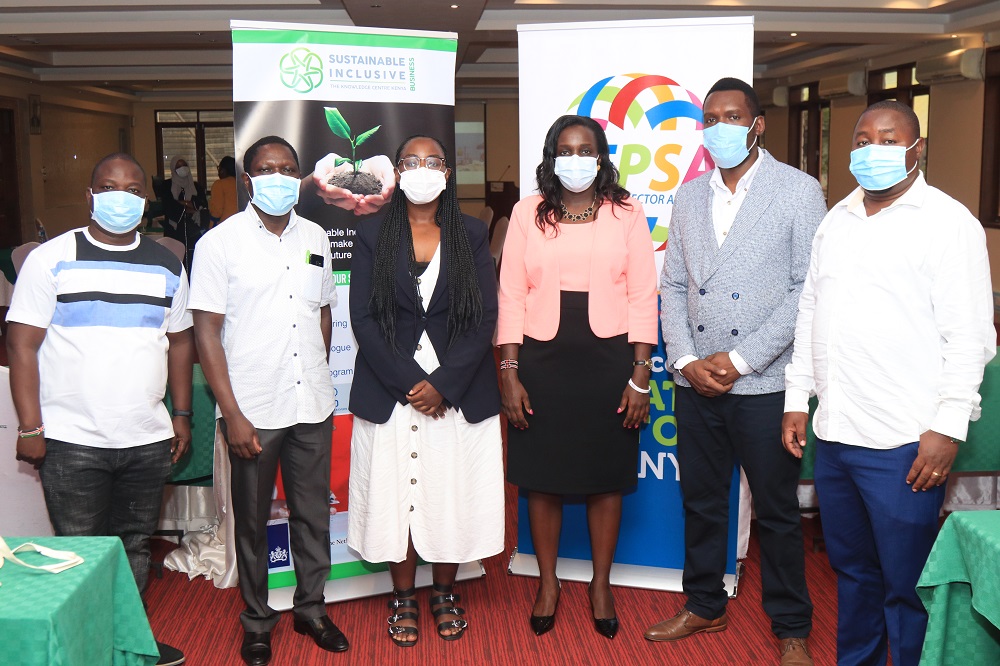Through Sustainable Inclusive Business, KEPSA’s newly launched project aims to empower women & youth in Mombasa’s Tudor informal settlement; by creating opportunities to generate income through sustainable trade
Today, the Kenya Private Sector Alliance (KEPSA) Foundation through Sustainable Inclusive Business; has launched an innovative and comprehensive project that will support youth and women in Mombasa to gain business skills. Dubbed ‘Creating Opportunities and Alleviating Poverty Through Sustainable Trade (COAST)’, the project will focus on the Tudor informal settlement; aiming to create awareness on waste management and increased residents’ capacity to develop business cases through mentorship.
Mombasa County CEC Environment Dr. Nato Godfrey who graced the official launch of the project at Travellers Beach Hotel in Mombasa town, lauded the initiative noting that “Such inclusive business ventures will go a long way in improving the living conditions of the low-income earners in Tudor. The county government of Mombasa is pleased to render the necessary linkages and support needed throughout the project, such as including the beneficiaries of the project into existing value chains.”
“Over 42% of Mombasa County’s population are youth aged between 15-34 years; its sheer size underscores the need for specific programs and projects targeting it. Thanks to KEPSA and The French Embassy for considering the youth and women in Mombasa’s Tudor for the COAST Project. Most importantly, is the choice of solid waste management and the partnerships with local communities,” Innocent Mugabe – Chief Officer, Ministry of Gender, Youth, Sports and Cultural Affairs, Mombasa County.
Mombasa county is one of the top trade and tourism hubs, contributing significantly to Kenya’s over Ksh 160 billion tourism industry. In 2019, the county attracted 128,222 global visits, out of the more than 2 million international visits to the country.
However, despite these palms, Mombasa has over 70 informal settlement areas accounting for approximately 65% of the county’s population. Solid waste management in most of these areas has become a challenge, especially due to poor infrastructure which makes it difficult for garbage collectors to gain access. High unemployment rates and poverty have resulted in increased struggle for resources among residents at the bottom of the pyramid.
 “We are excited about the COAST project, through which KEPSA will contribute to the achievement of Sustainable Development Goal (SDG) 1 on alleviating poverty; as well as Kenya’s vision 2030 on developing targeted pro-poor projects,” said KEPSA’s Deputy CEO, Martha Cheruto. She added that, “We have identified a waste challenge in one of the county’s informal settlements, and we will use this project to provide sustainable solutions that will not only lead to a cleaner environment, but will also create employment opportunities among area residents.”
“We are excited about the COAST project, through which KEPSA will contribute to the achievement of Sustainable Development Goal (SDG) 1 on alleviating poverty; as well as Kenya’s vision 2030 on developing targeted pro-poor projects,” said KEPSA’s Deputy CEO, Martha Cheruto. She added that, “We have identified a waste challenge in one of the county’s informal settlements, and we will use this project to provide sustainable solutions that will not only lead to a cleaner environment, but will also create employment opportunities among area residents.”
The COAST project will focus on helping women and youth in Tudor establish waste management businesses, through training and facilitation to harness their entrepreneurship skills. It will also enhance their capacity to access financing by linking them to financial institutions; based on their business environmental impact. The expected outcome is to alleviate the level of poverty, through an alternative source of income for the residents.
“For us, this is a blueprint to achieve a habitable and sustainable future for the beneficiaries of the COAST project. We will adopt the circular economy model in supporting entrepreneurs to establish businesses that aim to present solutions in waste management, as well as using waste as an input for production. It is a creative and innovative approach that will address sustainable development challenges in the region,” stated Karin Boomsma, the Project Lead and Director of Sustainable Inclusive Business.
Findings show that most businesses fail within 5 to 10 years of their existence. Some of the contributing factors are the lack of business skills and financing especially for women and youth. “Through KEPSA’s networks, we will initiate a mentorship program to facilitate learning from experts in the private sector. This will provide inspiration, a core ingredient for successful entrepreneurs,” affirmed Ebenezer Amadi, the Project Manager.
About KEPSA
The Kenya Private Sector Alliance (KEPSA) is a limited liability membership organisation registered in 2003 as the apex body of private sector in Kenya.
KEPSA’s mandate is the voice of private sector in Kenya. KEPSA therefore is an inclusive and proactive body that provides an institutional framework for Government and private sector partnership; a facilitator for the private sector in public policy dialogue and an umbrella policy and networking institution for the private sector in Kenya; and, a promoter of public-private sector partnerships in addressing the challenges of wealth and employment creation in Kenya.
About Sustainable Inclusive Business
Sustainable Inclusive Business – Kenya is a project, funded by the Netherlands Government and hosted by the Kenya Private Sector Alliance (KEPSA) under its Foundation. The project’s objective is to encourage businesses to be sustainable and inclusive with a positive impact on People, Planet and Profit. This is achieved through sharing information on best practices and viable sustainable business models, implementation of sustainable business policies as well as creating partnerships.
For Press Inquiries, Please Contact:
Josephine Wawira – Communications Officer, Sustainable Inclusive Business


